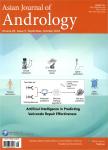3omorbidity and survival of patients selected for radica prostatectomy at an age of 75 years or older
3omorbidity and survival of patients selected for radica prostatectomy at an age of 75 years or older作者机构:Departments of Urology University Hospital 'Carl Gustav Carus' Dresden University of Technology Dresden D-01307 Germany Department of Medical Statistics and Biometry University Hospital 'Carl Gustav Carus' Dresden University of Technology Dresden D-01307 Germany
出 版 物:《Asian Journal of Andrology》 (亚洲男性学杂志(英文版))
年 卷 期:2013年第15卷第5期
页 面:667-671页
核心收录:
学科分类:0710[理学-生物学] 090502[农学-动物营养与饲料科学] 07[理学] 0905[农学-畜牧学] 08[工学] 09[农学] 071007[理学-遗传学] 0901[农学-作物学] 0836[工学-生物工程] 090102[农学-作物遗传育种]
主 题:comorbidity old age overall survival prostate cancer radical prostatectomy relative survival
摘 要:Radical prostatectomy in elderly patients is controversial. To identify very old candidates for radical prostatectomy with the highest probability of long-term survival, we studied 47 consecutive men who underwent radical prostatectomy between 1992 and 2005 at an age of 75 years or older. A heuristic approach was used to search for subgroups with particularly high long-term survival. Several two-sided comorbidity measures and combinations of these measures were investigated to find classifications best identifying healthy, long-living elderly candidates for radical prostatectomy. Four of the 25 two-sided comorbidity classifications or combinations reached the significance level with hazard ratios between 4.00 and 4.80. After 10 years, patients identified as healthy patients according to these comorbidity measurements had exhibited relative survival rates between 129% and 137% and overall survival rates between 86% and 95%, whereas those with comorbidities had exhibited relative survival rates of only 66%-84% and overall survival rates of 44%-58%. In conclusion, classifying comorbidity may identify a meaningful proportion of men selected for radical prostatectomy at an age of 75 years or older with an excellent long-term survival probability superseding that of the general population.



